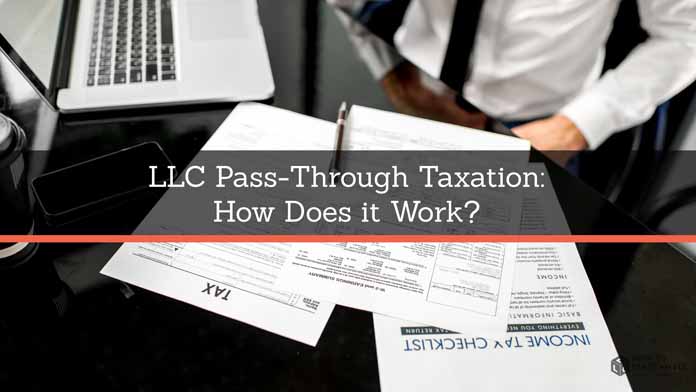LLC Pass-Through Taxation
One of the benefits of an LLC’s default tax structure is that it’s not subject to double-taxation, unlike a corporation. Instead, all of the business’s profits and losses will pass through to the members. In this article, we’ll further explain how pass-through taxation works, its pros and cons, and alternative options.
To find out whether your LLC is required to get an Employer Identification Number through the IRS prior to filing taxes, visit our EIN for LLC guide.
Recommended: One consultation with 1-800 Accountant could save your business thousands in taxes. Schedule Your Free Call.

What is Pass-Through Taxation?
Sole proprietorships, partnerships, S corporations, and LLCs are all subject to pass-through taxation. By default, the IRS regards single-member LLCs as “disregarded entities” and multi-member LLCs as general partnerships.
Pass-Through Entities
Both default tax structures (disregarded entity and partnership) undergo pass-through taxation, which means that rather than paying corporate taxes, an LLC’s profits will pass through to its members to be reported on their personal tax returns. All profits are only taxed once, at each member’s individual income tax rate.
Pass-through entities are also responsible for paying 15.3% of their profits in employment tax. If you want to save on employment taxes, consider learning more about S corp status.
Do I Pay Taxes on Retained Earnings?
If your LLC elects to be taxed as either a disregarded entity or a partnership, the IRS will not make a distinction between distributed profits and retained earnings. This is because the IRS does not consider these businesses to be separate entities from their owners. Any profits the business brings in are automatically considered the personal profits of the LLC’s members. For this reason, an LLC taxed in this way cannot lower its tax burden by reinvesting profits into the business.
If an LLC would like to take advantage of retained earnings while still enjoying pass-through taxation, it may benefit from electing S corp status. S corp owners who work for the business have their profits distributed as wages rather than distributions. The remainder of profits can be retained in the business or divided among owners as non-dividend distributions.
Owners are required to pay both personal income tax and self-employment tax on their regular wages. Retained earnings, however, are never subject to self-employment tax, even when they are distributed to owners. To avoid raising eyebrows at the IRS, S corp owners must limit the amount of profit they retain in the business and be sure to pay owners a “reasonable salary” based on their position and industry.
How Are Losses Handled with Pass-Through Taxation?
Just like with profits, LLCs taxed as pass-through entities report their losses on their personal tax returns. While the specifics can vary significantly depending on your business, generally speaking, your reported losses will reduce overall tax liability.
Pros and Cons of Pass-Through Taxation
Pass-through entities offer their owners two main benefits:
- The structure is simple and allows owners to combine their personal and business income for tax purposes. This can be particularly helpful for smaller businesses looking to streamline their operations.
- All business profits are only taxed once, at the owners’ personal tax rate. This differs from corporate profits, which are taxed first at the corporate tax rate and later at shareholders’ personal rate when distributed as dividends.
These features can make pass-through taxation an attractive option, but it does come with some disadvantages. One major downside to pass-through entities is the requirement that they pay employment tax on all profits. This 15.3% tax covers both the employee and employer portion of Social Security and Medicare tax. While S corps can reduce their employment tax burden by retaining a portion of their profits, all wage earnings are still subject to both income tax and employment tax.
The New 20% Pass-Through Tax Deduction
An additional advantage of pass-through entities was created by the Tax Cuts and Jobs Act of 2017, which included a 20% tax deduction for owners of pass-through entities. This means that owners can deduct up to 20% of the company’s qualified business income (QBI) on their personal tax return. While this deduction will benefit many business owners, there are a few details to consider.
- For 2019, single filers making less than $160,700 and joint filers making less than $321,400 are eligible for the full 20% deduction on their pass-through income no matter what type of business they run.
- Single filers making more than $207,500 and joint filers making more than $415,000 are subject to some limitations. Owners of personal service businesses who pass these thresholds are not eligible for any deduction. Those in different business categories may still be eligible for a limited deduction based on the amount of wages they pay and the type of property they own.
- Those with income levels between the above thresholds are eligible for a limited deduction no matter what type of pass-through business they run.
Do I Have to Choose Pass-Through Taxation?
While the default tax treatment for a single-member LLC and multi-member LLC is pass-through taxation, owners may elect to be taxed as C corporations. An LLC that chooses to be taxed in this way will have its business profits taxed at the current 21% corporate tax rate. All profits that are distributed to owners as dividends will then be taxed at each member’s personal income tax rate. This phenomenon is referred to as double taxation.
C corps’ retained earnings are not subject to income tax as long as they are reinvested into the business and not distributed to shareholders.
The IRS has placed a limit of $250,000 on corporate retained earnings. A corporation that accumulates more than this amount with no clear use for it within the company may be subject to a 20% accumulated earnings tax on all retained funds exceeding the threshold.
Get a Free Consultation
1-800 Accountant offers easy to use accounting software and excellent customer support to easily manage your finances and file your taxes.
When Does It Make Sense to Be Taxed as a C-Corporation?
While pass-through entities are very attractive business options, electing to be taxed as a C corporation can offer a number of benefits to an LLC:
- No self-employment tax.
- Formal investors often prefer working with C corps.
- More potential expense write-offs:
- Health insurance premiums
- Life insurance
- Health savings plans
- Retirement plans
- Gym memberships
- Company vehicles
- Housing benefits
- Potential deductions on state tax.
- Many states with their own corporate income tax allow C corps to deduct their federal tax payments. This may or may not be a benefit depending on what your corporate vs. pass-through tax liability would be in your state.
- Many states with their own corporate income tax allow C corps to deduct their federal tax payments. This may or may not be a benefit depending on what your corporate vs. pass-through tax liability would be in your state.
- Potential reduction of overall tax burden.
- Since the Tax Cuts and Jobs Act reduced the corporate tax rate from a top rate of 35% to a flat rate of 21%, some business owners in higher personal tax brackets may benefit from corporate taxation over pass-through taxation.
- Since the Tax Cuts and Jobs Act reduced the corporate tax rate from a top rate of 35% to a flat rate of 21%, some business owners in higher personal tax brackets may benefit from corporate taxation over pass-through taxation.


